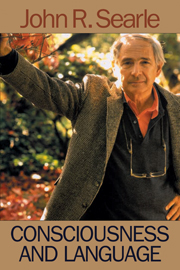Book contents
- Frontmatter
- Contents
- Introduction
- 1 The Problem of Consciousness
- 2 How to Study Consciousness Scientifically
- 3 Consciousness
- 4 Animal Minds
- 5 Intentionality and Its Place in Nature
- 6 Collective Intentions and Actions
- 7 The Explanation of Cognition
- 8 Intentionalistic Explanations in the Social Sciences
- 9 Individual Intentionality and Social Phenomena in the Theory of Speech Acts
- 10 How Performatives Work
- 11 Conversation
- 12 Analytic Philosophy and Mental Phenomena
- 13 Indeterminacy, Empiricism, and the First Person
- 14 Skepticism About Rules and Intentionality
- Name Index
- Subject Index
2 - How to Study Consciousness Scientifically
Published online by Cambridge University Press: 14 January 2010
- Frontmatter
- Contents
- Introduction
- 1 The Problem of Consciousness
- 2 How to Study Consciousness Scientifically
- 3 Consciousness
- 4 Animal Minds
- 5 Intentionality and Its Place in Nature
- 6 Collective Intentions and Actions
- 7 The Explanation of Cognition
- 8 Intentionalistic Explanations in the Social Sciences
- 9 Individual Intentionality and Social Phenomena in the Theory of Speech Acts
- 10 How Performatives Work
- 11 Conversation
- 12 Analytic Philosophy and Mental Phenomena
- 13 Indeterminacy, Empiricism, and the First Person
- 14 Skepticism About Rules and Intentionality
- Name Index
- Subject Index
Summary
Introduction
The neurosciences have now advanced to the point that we can address – and perhaps, in the long run, even solve – the problem of consciousness as a scientific problem like any other. However there are a number of philosophical obstacles to this project. The aim of this article is to address and try to overcome some of those obstacles. Because the problem of giving an adequate account of consciousness is a modern descendant of the traditional ‘mindbody problem’, I will begin with a brief discussion of the traditional problem.
The mind-body problem can be divided into two problems; the first is easy to solve, the second is much more difficult. The first is this: what is the general character of the relations between consciousness and other mental phenomena on the one hand and the brain on the other? The solution to the easy problem can be given with two principles: first, consciousness and indeed all mental phenomena are caused by lower level neurobiological processes in the brain; and, second, consciousness and other mental phenomena are higher level features of the brain. I have expounded this solution to the mindbody problem in a number of writings, so I will not say more about it here (but see Searle 1984, 1992).
The second, and more difficult problem, is to explain in detail how consciousness actually works in the brain. Indeed, I believe that a solution to the second problem would be the most important scientific discovery of the present era.
- Type
- Chapter
- Information
- Consciousness and Language , pp. 18 - 35Publisher: Cambridge University PressPrint publication year: 2002
- 2
- Cited by



